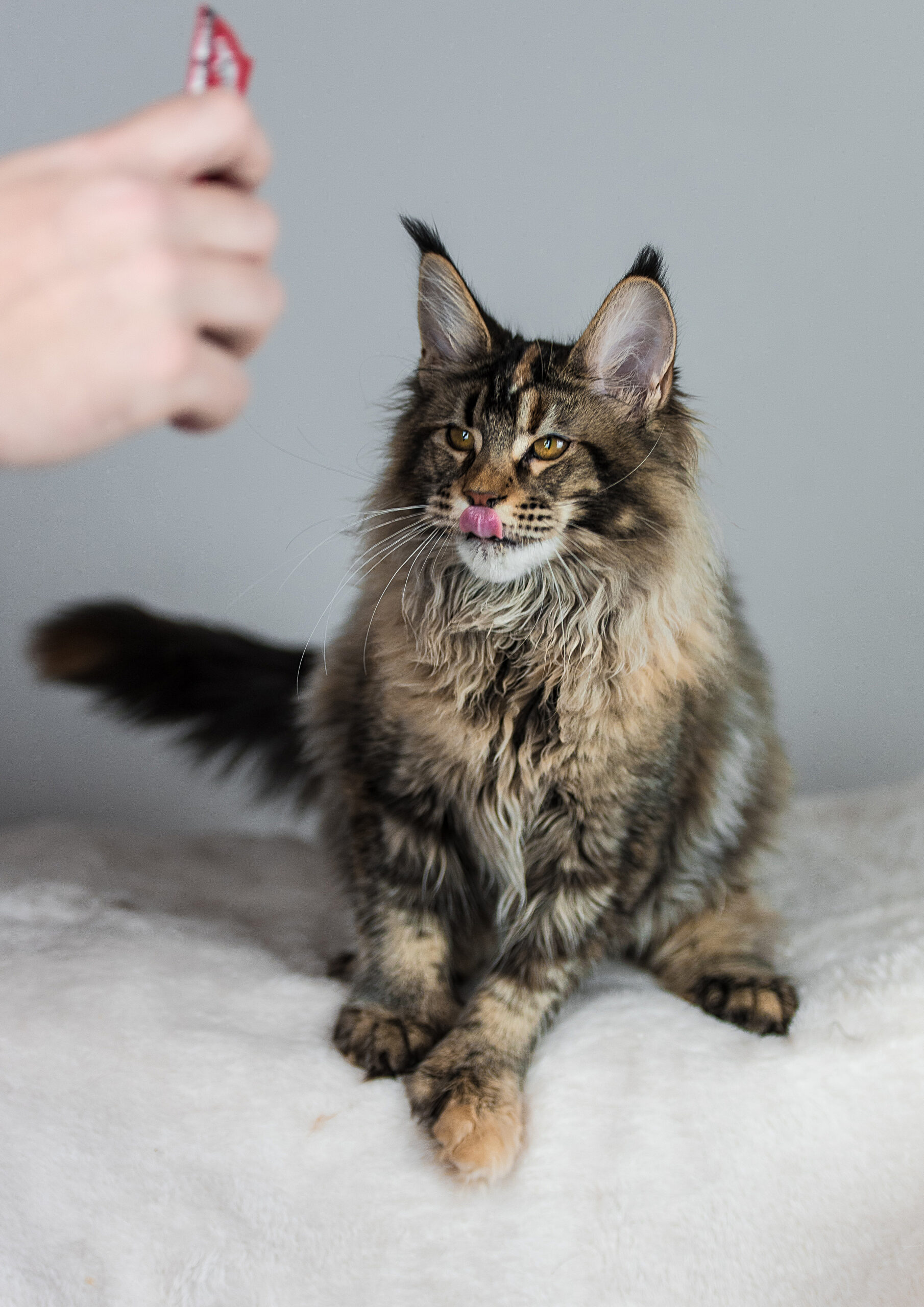Kitten Recommendations
Please read through these & feel free to message any questions that aren’t covered in here! Thank you!!

A quality cat tree is great for your cat! Maine coons + cats in general usually like to sit high up on their perch 😹
Cat Tree King is hands down the best place to get your MC a cat tree. A good chunk of their trees were made with the Maine Coon in mind. It is more $$$ but it is an investment that will outlive a cheaper one from amazon. They are very sturdy and will last you years.
If you would like a cat tree that is a little less expensive, you can find several good options on Amazon or Chewy. Here is our amazon list with some other recommendations!
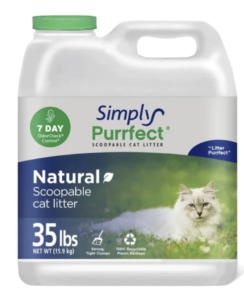 When your kitten is with us we try to train them on a few different things to allow owners to choose what route they’d like to go once the kitten goes home. Our kittens use pine pellets, clumping litter (simply purrfect from costco) in a litter robot & stainless still pan.
When your kitten is with us we try to train them on a few different things to allow owners to choose what route they’d like to go once the kitten goes home. Our kittens use pine pellets, clumping litter (simply purrfect from costco) in a litter robot & stainless still pan.
At first kittens are strictly trained on pine pellets so they don’t ingest clumping litter. This is a great option to keep with as the large bags usually are $6-7 your local tractor supply. The pros to this is pine pellets are great at keeping odors away (what’s left is wood smell) the con with it is as the pellets break down saw dust will start to track around. So it’s important to keep it clean. We usually dump ours our every few days.
We use the simply purrfect litter from costco. It doesn’t have too strong of scent and clumps great. We have used it for many years now.
It is important to try to use the same litter we use for at least the first 30 days to ensure a smooth transition. Then you can slowly transition to the litter of your choice.
When you first get your kitten home we recommend you use a litter attractant (especially if you can’t get your hands on the litter or pellets we use) to help your kitten with the transition. You buy it and just mix it into the litter. It’s as easy as that! And yes, you can still use a litter attractant with pellet litter.
We recommend to always stick with more natural options. Please read the PDF guide below that goes over the transition period more in-depth.
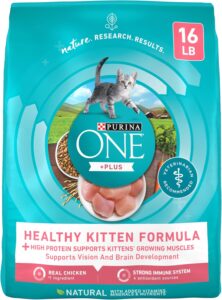
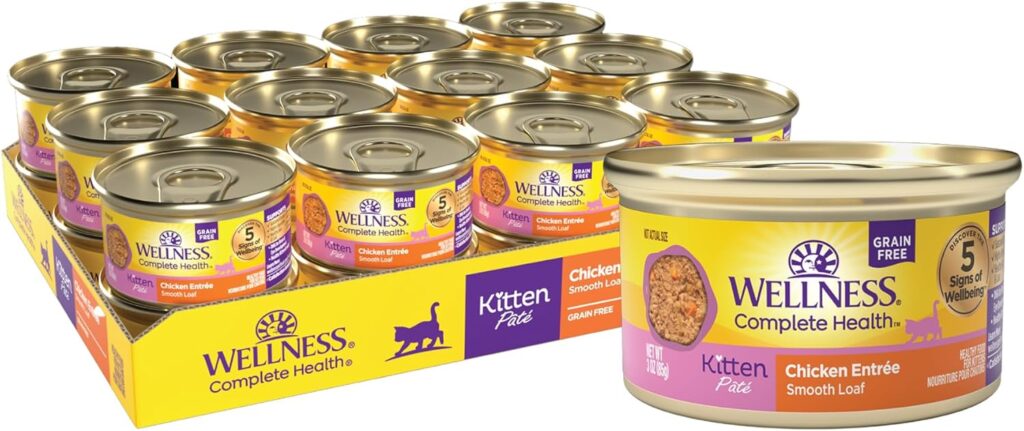
This is what your maine coon kitten is raised on! Please keep them on this for at least 30 days (this is noted in the contract) We don’t want to be changing too much on the kittens. Too quick of food change can make the kitten sick. Changes to diet need to happen very gradually.
Purina One Kitten Food
Please give your kitten access to the kibble 24/7 at first. We give them the wet food morning and night.
Please don’t use plastic bowls or bowls that will give whisker fatigue. And try to use filtered water.
Please read the next section regarding our next steps for food recommendations.
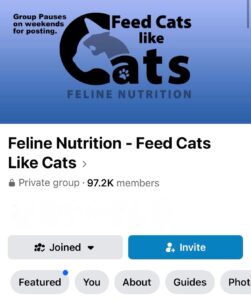
Please read through this! The health of your new cat will depend mostly on the diet it receives. This is very important.
Join this FB group & read the “Guides” they have this goes over everything we wish to share with you.
They even have a “canned” food list that they keep updated. There is no perfect food so they have taken the time to list out the pros and cons of their approved food list.
Please don’t only feed the cat/kitten a kibble only diet. It is terrible for their kidneys. A diet lacking moisture can lead to urinary tract issues, IBD, obesity & chronic renal failure to name a few. Approximately, 85% of cats have periodontal disease & those cats are fed kibble and is not doing their teeth any favors.
Here are some articles that go over this:
- https://catinfo.org/ https://feline-nutrition.org/
health/species-inappropriate- the-dangers-of-dry-food - https://feline-nutrition.org/
answers/answers-what-dry-food- does-to-your-cats-appetite - https://feline-nutrition.org/
health/open-wide-the-basics- of-kitty-dentals - https://littlebigcat.com/why-
dry-food-is-bad-for-cats- and-dogs/ - https://littlebigcat.com/why-
cats-need-canned- food-2/ - https://littlebigcat.com/does-
dry-food-clean-the- teeth/ - https://www.ncbi.nlm.nih.gov/
pmc/articles/ PMC6709657| - https://www.ncbi.nlm.nih.gov/
pubmed/24492545
The many benefits of raw feeding are:
- Great shiny coats
- No more UTI, due to dehydration
- No more IBS (irritable bowel syndrome)
- No more flaky skin
- No more restlessness, due to “meat flavored cereal starvation”
- Likely at least 5 years more for your pet to live
- No more shattered teeth from dry kibble
- No (or very little) hairballs
- No more obesity
- No more dental and gum issues (unless your cat has received the Calici vaccine booster that also cause gum issues)
- No more food allergies
THE LIST GOES ON AND ON…
Raw Food: Our breeding cats are fed primarly raw food with a rotation of high quality wet food. We do a variety to keep them from getting bored and also when queens are pregnant it is very important they have a balanced diet.
Here are the links:
These meal completers above super easy! All you have to do is add meat.
https://hare-today.com/raw_food_for_cats
Hare today has completed meals with many proteins to pick from already ready to go! That page goes over all you need to know for it.
Ground Chicken/Bones/Organs 80/10/10
Ground Duck/Bones/Organs 80/10/10
Ground Quail/Bones/Organs 88/10/2
Ground Rabbit/Bones/Organs 75/15/10
Ground Turkey/Bones/Organs 80/10/10
If you do this with your kitten (highly recommended to get them in the habit of it) it’s best if they eat 3-4 meals a day. As much as they want. And put the raw away after 20-30 minutes so it doesn’t go bad.
Do not feed canned food with the raw or shortly before or after. If you feed canned food make sure it is only at night (commercial food takes 8 hours to digest & digests differently than raw good.
Rule of Thumb: BIRD protein (turkey, chicken, duck etc) should make about 2/3 of your cat’s diet. BIG ANIMAL protein (pork, beef etc) no more than about 1/3 of your proteins. Again, your kitten will need several proteins to stay healthy. All proteins have nutritional advantages and disadvantages. Some are higher in calcium or protein than others, some are higher in fat which they need.
Never feed fish for more than 10% of your cat’s diet! It depletes thiamine and causes other issues like hyperthoirodism. Do NOT feed raw rabbit or chicken breast every day as it does not have enough fat and taurine. 3-5 different animal proteins is minimum are optimal!
DO NOT FEED TREATS IN BETWEEN MEALS, DO NOT FEED KIBBLE DURING THE DAY. THIS WILL GREATLY MESS UP THE RAW FEEDING AND MAKE YOUR CAT INTO A DRY FOOD JUNKIE. IT WILL ALSO CAUSE DIGESTIVE UPSET. There is plenty of time to feed treats to your cat when she/he has grown up (note that many treats will always mess up the raw meat diet).
Important: If your kittens gets fussy and you are not able to feed several meat proteins per week, it is recommended to put him/her on a commercial canned food as one of the meals per day. This will make up for any nutrients he/she will be lacking. For example, your cat/kitten absolutely cannot exist on rabbit/pork or just beef (many cats can’t digest a lot of beef. Feed beef sparingly).
For Toppers: You can sprinkle a very small amount of NUTRITIONAL YEAST FLAKES, BEEF/HOKI FREEZE DRIED or B-STRONG POWDER on top of their food on days when they don’t like it!
You can use chicken necks for teeth cleaning ONCE per week. (Feed in the shower stall and rinse after). NOT more than once per week!
NEVER HESITATE TO ASK FOR HELP WITH THE RAW FEEDING.
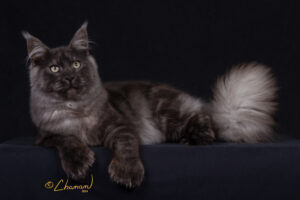
Some Maine Coons don’t need much grooming at all, while some need daily maintenance. It all depends on the hair type of your Maine Coon, and unfortunately their isn’t any way to tell what level of groom maintenance they will need until they reach adulthood.
This grooming set is great to have on hand. Some Maine Coons require regular “sanitary trims”. It is also good. to keep on hand if your MC develops a mat you can’t comb out. You will want to use a stainless steel, long-toothed comb. Doing this will help hopefully prevent mats from ever forming. DO NOT ever use a FURminator on your Maine Coon! A FURminator actually cuts the undercoat and can permanently damage your cat’s coat. There are several different brands that all have basically the same kind of tools. Do not use any of them!
You will also want a pair of nail-trimming scissors. We will have our favs in our amazon links. This is especially important for our polydactyl kitten owners! Make sure you’re getting each and every nail and trimming every 2 weeks. Your kitten will be sent home with nail trimmers and the metal comb. So no need to buy it unless you ever need a replacement.
Some Maine Coons are prone to “runny” eyes, or will get eye “crusties” in the inside corners. This does not necessarily mean they are sick or that anything is wrong with them, especially if it happens on a daily basis. (Sudden runny eyes may be a sign of a respiratory infection). To help combat that and keep the fur around their eyes clean and beautiful, you can use these wipes that are wonderful!
We like to give out maine coons a bath + blow out every 4-5 months (sometimes more frequently if their coat calls for it) If this isn’t your thing we recommend taking them to a groomer for it.
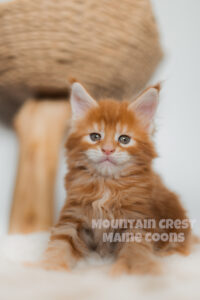 Oral Health:
Oral Health:
Brush your cat’s teeth if you can. Use a product called “healthy mouth” BEFORE your kitten/cat gets inflamed gums from teething. Also, use coconut oil with a soft tooth brush to do weekly brushing if you do not want to feed chicken necks.
Chicken necks are really good for their teeth/ oral health though. Only do it 1x a week.
A Feliway diffuser can help to calm your kitten when he/she first arrives at your home. It can also help in times of stress.
If you find that your kitten gets stressed on car rides or trips to the vet, you can try this Composure supplement to help calm them.
Carrier for maine coons once they are full grown (this is for trips to the vet and other travels) this won’t fit under the airplane seat. This is what we use for cat shows and fits under most airlines.
Per our contract your kitten needs to be seen by your vet within 48 hours of when you receive them. They are seen by our vet prior to leaving but this is to confirm on your end that all Is well also 🙂
Please don’t do FELV vaccines the cons outweight the pros and these cats are not to be wandering around outside where they can be bit by a street cat. This article goes over that + some other info.
We recommend just the 2 FVRCP vaccines that are given to the kittens prior to going home. They are also not supposed to have boosters every year. Please message if you have any questions about this.
